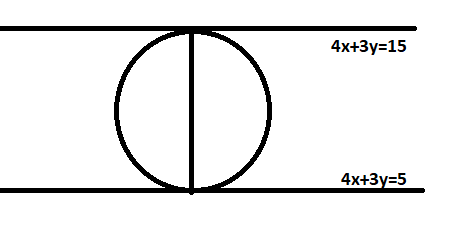Question
Question: The area( in square unit) of the circle which touches the lines \[4x + 3y = 15\]and \[{\text{4x + 3y...
The area( in square unit) of the circle which touches the lines 4x+3y=15and 4x + 3y = 5is mπ . Find m.
Solution
We have two lines as 4x+3y=15and 4x+3y=15. We can see both lines are parallel altogether. So using the formula for distance between two parallel lines, which is the perpendicular distance between two parallel lines, ax+by+c=0and ax+by+d=0is denoted by, a2 + b2∣c - d∣units, we’ll find the diameter of the circle resulting in the radius. So, using the radius we’ll find the area of the circle using the formula of area of the circle which is π (radius)2, and then comparing it with the given area of circle, we find the value of m.
Complete step by step Answer:
Here, We have two lines as 4x+3y=15and 4x+3y=15.
And it is clear that they are parallel.

Since both lines are parallel, (visible from the image)
So, we will have the Diameter=the perpendicular distance between two lines,
Now the perpendicular distance between two lines, ax+by+c=0and ax+by+d=0is denoted by,
a2 + b2∣c - d∣units
So, we have here, a = 4, b = 3, c = - 15,d = - 5,
The perpendicular distance would be,
16 + 9∣ - 15 - ( - 5)∣units
= 510 = 2units
So, Diameter is 2 units,
Now, the radius is, 2D = 22 = 1units,
We are finding the area now, so, area= π (radius)2={\text{$\pi$ (1}}{{\text{)}}^{\text{2}}}$$$${\text{ = $\pi$ }}units
So, we have, mπ = π
So, m = 1.
Note: The perpendicular distance formula of the lines is used here. We see the perpendicular distance between two lines, ax+by+c=0and ax+by+d=0is denoted by,
a2 + b2∣c - d∣units.
We can also find the distance between two lines by taking any point on one line and then by using the formula for a point from a line i.e.
Let the point be (l,m) and equation of line be ax+by+c=0
The distance between thema2 + b2∣lx + bm + c∣
After finding the diameter you should not forget to find its radius first and then the area, otherwise, the answer would be wrong.
